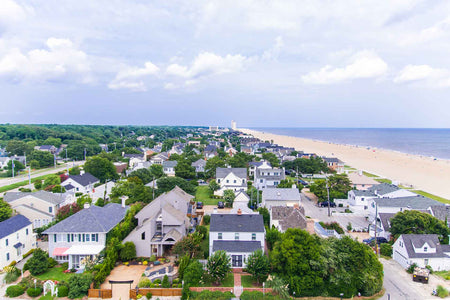South Carolina is known for its beautiful landscapes, warm weather, and unfortunately, its high pollen count. Allergy season in the Palmetto State can be brutal for those sensitive to pollen, dust, and other allergens. If you find yourself struggling during allergy season, fear not! There are ways to survive and even thrive during this challenging time.
Allergy season in South Carolina can be a tough time for many residents due to the high pollen count and other common allergens in the region. If you're someone who experiences symptoms like sneezing, watery eyes, or congestion during this time, you're not alone. The good news is that there are effective treatments and strategies to help you manage your allergies and enjoy the beauty of the Palmetto State without constant discomfort. In this blog post, we will explore the different allergens prevalent in South Carolina, common allergy symptoms, and tips for treatment and relief.
South Carolina Allergy Seasons
Understanding how allergies can vary by season is crucial for managing symptoms and seeking appropriate treatment.
Spring Allergies
Spring in South Carolina brings blooming flowers and trees, but also a surge in pollen levels. Pollen from trees like oak, pine, and cedar can trigger allergic reactions in many individuals. Common symptoms include sneezing, itchy eyes, and congestion. Approximately 30% of people in South Carolina suffer from spring allergies.
Summer Allergies
While summer is a time for outdoor activities, it can also exacerbate allergies in South Carolina. Grass pollen levels tend to peak during this season, leading to increased symptoms for those allergic to grass. Additionally, mold spores thrive in the warm and humid climate of the state, further contributing to allergy issues.
Fall Allergies
As the weather cools down in the fall, ragweed becomes a major allergen in South Carolina. Ragweed pollen can travel long distances, causing widespread allergic reactions. In addition to ragweed, mold spores remain prevalent during the fall months, continuing to trigger symptoms in allergy sufferers.
Winter Allergies
Winter in South Carolina may provide relief for some allergy sufferers, as pollen levels decrease significantly. However, indoor allergens like dust mites, pet dander, and mold can still trigger symptoms during this season. Approximately 20% of people in South Carolina experience winter allergies.
Common South Carolina Allergens By Region
Understanding these regional differences can help individuals better manage their allergies and seek appropriate treatment. Let's explore the common allergens found in different parts of South Carolina.
Lowcountry
The Lowcountry region of South Carolina, including areas like Charleston and Hilton Head, is known for its high pollen levels. Pollen from oak, pine, and grasses can trigger allergic reactions in many residents. Mold spores are also prevalent in this humid region, especially after heavy rainfall.
Midlands
In the Midlands region, which includes Columbia and surrounding areas, ragweed is a common allergen that affects many individuals. Additionally, the presence of dust mites in homes can exacerbate allergy symptoms for residents in this region.
Upstate
The Upstate region, encompassing cities like Greenville and Spartanburg, experiences high levels of pollen from trees such as birch, cedar, and maple. Individuals in this region may also be sensitive to mold spores, particularly during the wetter months of the year.
Coastal Region
Along the coastal region of South Carolina, including Myrtle Beach and Beaufort, allergens like sea breeze can exacerbate respiratory allergies. Additionally, the proximity to the ocean can lead to higher humidity levels, creating an environment conducive to mold growth.
Treating Seasonal Allergies
Allergic reactions to tree pollen, ragweed pollen, and other allergy triggers we have mentioned can wreak havoc on your everyday life. Luckily, there are three general ways to fight back– medications, allergen immunotherapy, and lifestyle changes. Each method has its own pros and cons.
Medications
The most widespread allergy treatments are medications, which can be divided into oral and topical treatments.
Oral medications include drugstore pill and liquid allergy medications. Examples include Claritin, Allegra, and Benadryl. Though these medications are easy to take and are partially effective, they also cause significant side effects in many people, especially because the medication is absorbed in the entire body.
Topical allergy treatments, which are predominantly nasal sprays, are the gold standard for treatment. Nasal sprays address symptoms directly at the source, which is inside the nose. Because nasal sprays are only absorbed by the nose, there is little to no absorption by the rest of the body, and so the side-effects tend to be much less than oral medications. Most drugstore nasal sprays only treat one or two allergy symptoms, and often take at least a week to have an effect. Therefore to get relief, you would need to use multiple nasal sprays.
Despite the prevalence of single-symptom nasal sprays, there is a prescription nasal spray available on the market that treats all of your allergy symptoms in just one bottle. Keep reading to learn more about Allermi!
Allergy shots/drops
Allergen immunotherapy, better known as allergy shots or drops, is a treatment in which your immune system is exposed to small doses of specific reactive allergens over time through injections or drops under the tongue. This encourages your immune system to build natural immunity against your individual triggers.
Unfortunately, it is an expensive, time-consuming process that can take a least a year to have an effect.
Lifestyle changes
The final way to address seasonal allergies is to make lifestyle changes. Using an air purifier in your bedroom, avoiding extended periods of time outdoors, keeping your bedroom windows closed during high pollen seasons, and washing bed sheets frequently are all things you can do to minimize allergy flare-ups.
It is important to keep in mind that lifestyle changes, while they can help, are by themselves not a viable option for those with severe allergies.
Allergy Season in South Carolina FAQ
Here are some frequently asked questions to help you navigate allergy season in South Carolina:
What are the common allergens in South Carolina?
South Carolina is known for its high pollen count, especially in the spring and fall. Tree pollen, grass pollen, and ragweed are some of the most common allergens that trigger allergic reactions in residents.
When is allergy season in South Carolina?
Allergy season in South Carolina typically starts in the spring, around March, and can last until the fall, as late as November. However, some people may experience allergies year-round due to indoor allergens like dust mites and pet dander.
How can I manage my allergies during peak season?
To manage your allergies during peak season, it's important to stay indoors during high pollen days, keep windows closed, use air purifiers, and regularly clean your living space. Over-the-counter antihistamines and nasal sprays can also provide relief.
Can allergies be prevented in South Carolina?
While allergies can't be completely prevented, there are steps you can take to reduce your exposure to allergens. Keeping your living space clean, using allergen-proof bedding covers, and staying informed about pollen forecasts can help minimize your allergy symptoms.
Customized Allergy Treatment at Home
Using multiple over-the-counter allergy treatments is not ideal for getting through allergy season in South Carolina. Skip the drugstore and get a personalized all-in-one allergy treatment from the comfort of your home.
Allermi is a customized allergy nasal spray designed by experienced, board-certified allergists to solve your unique seasonal allergy symptoms. The Allermi formula is backed by science to give you the most effective allergy treatment for your individual allergy symptoms.
The best part? Allermi nasal spray is easy to use and delivered to your door in South Carolina.









